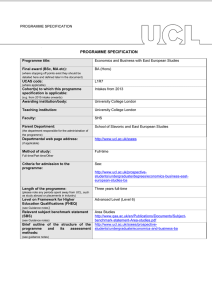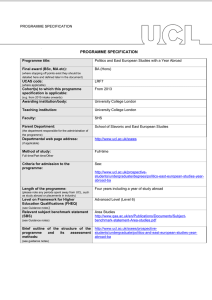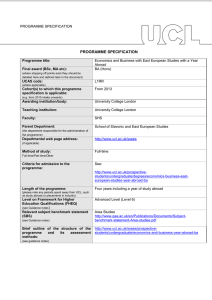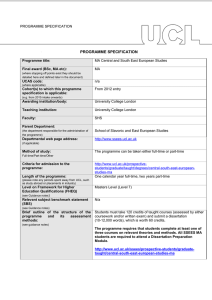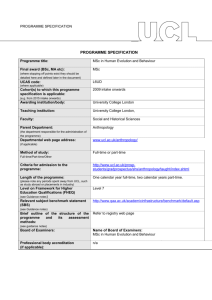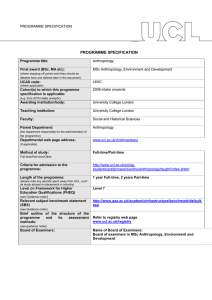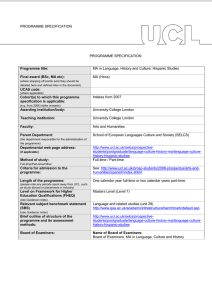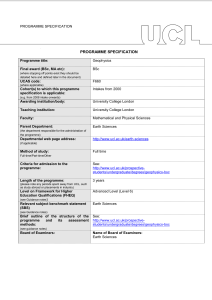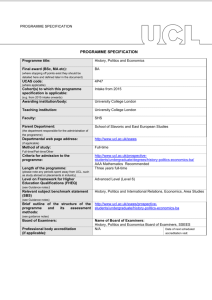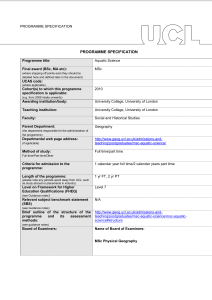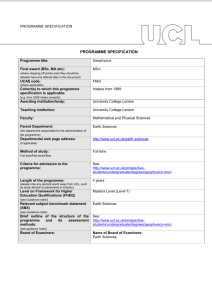BA Politics and East European Studies
advertisement
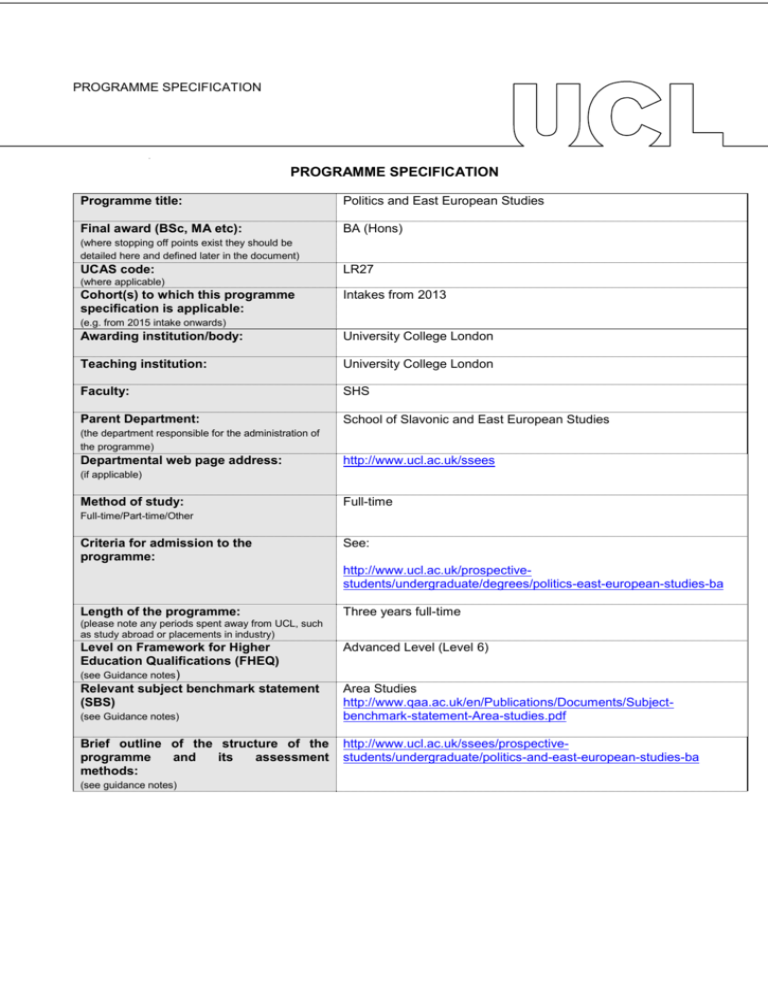
PROGRAMME SPECIFICATION PROGRAMME SPECIFICATION Programme title: Politics and East European Studies Final award (BSc, MA etc): BA (Hons) (where stopping off points exist they should be detailed here and defined later in the document) UCAS code: LR27 (where applicable) Cohort(s) to which this programme specification is applicable: Intakes from 2013 (e.g. from 2015 intake onwards) Awarding institution/body: University College London Teaching institution: University College London Faculty: SHS Parent Department: School of Slavonic and East European Studies (the department responsible for the administration of the programme) Departmental web page address: http://www.ucl.ac.uk/ssees (if applicable) Method of study: Full-time Full-time/Part-time/Other Criteria for admission to the programme: See: http://www.ucl.ac.uk/prospectivestudents/undergraduate/degrees/politics-east-european-studies-ba Length of the programme: Three years full-time (please note any periods spent away from UCL, such as study abroad or placements in industry) Level on Framework for Higher Education Qualifications (FHEQ) (see Guidance notes) Relevant subject benchmark statement (SBS) (see Guidance notes) Brief outline of the structure of the programme and its assessment methods: (see guidance notes) Advanced Level (Level 6) Area Studies http://www.qaa.ac.uk/en/Publications/Documents/Subjectbenchmark-statement-Area-studies.pdf http://www.ucl.ac.uk/ssees/prospectivestudents/undergraduate/politics-and-east-european-studies-ba Board of Examiners: Name of Board of Examiners: Politics and Sociology Undergraduate Board of Examiners, SSEES Professional body accreditation (if applicable): N/A Date of next scheduled accreditation visit: EDUCATIONAL AIMS OF THE PROGRAMME: The programme aims to develop the student’s interest and understanding of the region bounded by central and south east Europe, the Baltic States and the European states of the former Soviet Union through a social science framework, with specialisms in politics and international relations. Students acquire an understanding of the influence of the historical, social and economic factors on political processes and development in the region in a comparative context. Students’ knowledge and understanding of the region is reinforced and enhanced by a period of study abroad in the third year. Students acquire discipline and region-based skills, and an opportunity to learn a language of the region, which allows them to enter employment in governmental and non governmental organisations, business, the financial sector, teaching, the media, journalism and to undertake more advanced academic work. PROGRAMME OUTCOMES: The programme provides opportunities for students to develop and demonstrate knowledge and understanding, qualities, skills and other attributes in the following areas: A: Knowledge and understanding A knowledge and understanding of: Teaching/learning methods and strategies: 1. The political, social and economic structures of the region in a contemporary and historic framework and their interaction 2. Social science disciplines at an introductory level 3. The discipline of Politics to an intermediate level and a political analysis of the region at an advanced level. 4. The influence of historical, social and economic factors on political processes 5. An opportunity to learn a language of the region and/or international relations relating to the region Acquisition of 1, 3 and 4) is through lectures and classes involving group presentation, discussions and assessed and non-assessed coursework Acquisition of 2) is through introductory lectures and classes incorporating (non-assessed) coursework, normally in the form of essays. Classes involve group presentations and discussion. Language teaching 5) is provided in small-group classes and regular non-assessed course work and international relations by lectures and classes Assessment: Testing of the knowledge base (1-5) is through a combination of unseen written examinations, assessed coursework in the form of essays and a 10,000 word dissertation B: Skills and other attributes Intellectual (thinking) skills: Teaching/learning methods and strategies: 1. 2. 3. 4. Intellectual skills of reasoning and analysis are developed through the combination of lectures, classes and essay-writing. Classes, which involve presentations and discussion and which develop oral and writing skills, are provided for each course. These enable students to identify critical issues and to discuss and resolve problems. Class presentations are written up in essay form after discussion. Students receive written feedback on work produced. Region-specific courses encourage students to analyse qualitative and quantitative material from the region and to compare these with external analyses of the region. This enables students to integrate and synthesise materials from a range of sources. Skill 6) is developed by regular exposure to teacher-fellows from the region and interaction with a highly cosmopolitan student body. A multidisciplinary approach enables students to analyse political phenomena (e.g. governance) from a range of social science perspectives. Assessment: Reason critically Integrate and synthesise materials Identify and resolve problems Analyse issues in the light of the available evidence 5. Select and apply appropriate methodologies 6. Develop an understanding and appreciation of different cultures Assessment methods based on written examinations and assessed essay-work emphasise the learner's ability to demonstrate skills 1-5. Students are required to write a 10,000 word dissertation in their final year which involves the use of primary sources from the region. This involves the application of the skills 1-6 in a practical setting C: Skills and other attributes Practical skills (able to): Teaching/learning methods and strategies: 1. Find, select and analyse information 2. Use qualitative methods of analysis 3. Demonstrate bibliographical skills and referencing 4. Prepare , plan and write a dissertation using primary sources derived from the region and demonstrating the use of quantitative materials 5. Acquire a reading knowledge of a language of the region . Learners are provided with introductory courses on how to locate library sources and the use of information technology. The use of information technology is a vital component for essay writing, class presentations and writing the dissertation. Learners are provided with bibliographies for all courses which require them to seek information from the specialist library at SSEES in addition to more conventional library sources. Course bibliographies indicate relevant web site sources. Coursework essays and dissertations require referencing skills. Guides to writing and referencing are provided in the study skills handbook which is issued to all learners and is available on the intranet. Students are provided with a schedule for planning and writing dissertations and are allocated a supervisor for consultation. Students on language courses are taught in small groups. Assessment: The demonstration of skills 1-2 and 5) are primarily assessed through unseen examinations and assessed coursework . 3- 4) are assessed through the provision of a 10,000 dissertation. D: Skills and other attributes Transferable skills (able to): Teaching/learning methods and strategies: 1 The majority of courses involve class presentations, either singly or in groups, followed by class discussion which require the application of each of the skills 1-7. All courses involve regular written work in the form of essays. Regular feedback on written work is provided to the learner to develop oral and written presentation skills (1-2). Time management and the ability to meet deadlines (3) is acquired through the need to present assessed and non-assessed work according to schedule. Students receive a schedule for the preparation of dissertations which is monitored by their supervisor. Essays and dissertation requires the use of information technology involving regional sources (7) 2 3 4 5 6 7 Present materials in written form with appropriate and effective layout Present materials orally with clarity Manage time and meet deadlines Participate in groups Listen effectively and assess the relevance and importance of the ideas of others. Work independently Use information technology Assessment: Skills 1, 6and 7) are assessed by unseen written examinations, assessed coursework and a dissertation, the production of which involves the interaction of these skills. Regulations on supervision ensure that the dissertation is the students independent work (skill 6). Skill 3 is reinforced by penalties for late submission of assessed work and dissertations and sanctions for late submission of non-assessed work while progress on the dissertation is monitored by the supervisor and by submission of progress reports. Oral skills are not formally assessed. The following reference points were used in designing the programme: the Framework for Higher Education Qualifications: (http://www.qaa.ac.uk/en/Publications/Documents/Framework-Higher-Education-Qualifications-08.pdf); the relevant Subject Benchmark Statements: (http://www.qaa.ac.uk/assuring-standards-and-quality/the-quality-code/subject-benchmark-statements); the programme specifications for UCL degree programmes in relevant subjects (where applicable); UCL teaching and learning policies; staff research. Please note: This specification provides a concise summary of the main features of the programme and the learning outcomes that a typical student might reasonably be expected to achieve and demonstrate if he/she takes full advantage of the learning opportunities that are provided. More detailed information on the learning outcomes, content and teaching, learning and assessment methods of each course unit/module can be found in the departmental course handbook. The accuracy of the information contained in this document is reviewed annually by UCL and may be checked by the Quality Assurance Agency. Programme Organiser(s) Name(s): Dr Felix Ciuta Date of Production: 10 June 2008 Date of Review: 17 August 2015 Date approved by Head of Jan Kubik, 23 September 2015 Department: Date approved by Chair of Anne White, 14 September 2015 Departmental Teaching Committee: Date approved by Faculty October 2015 Teaching Committee
